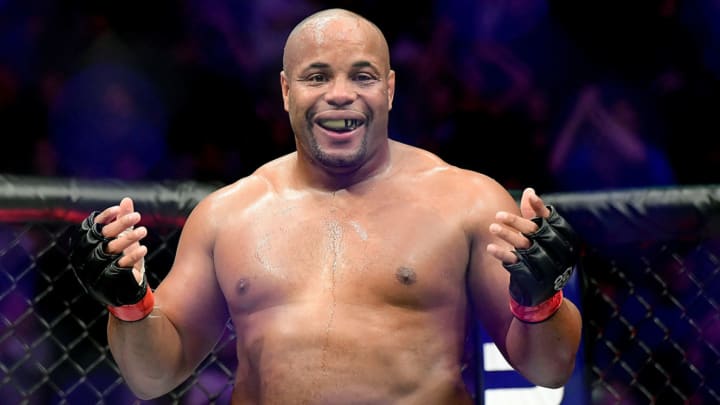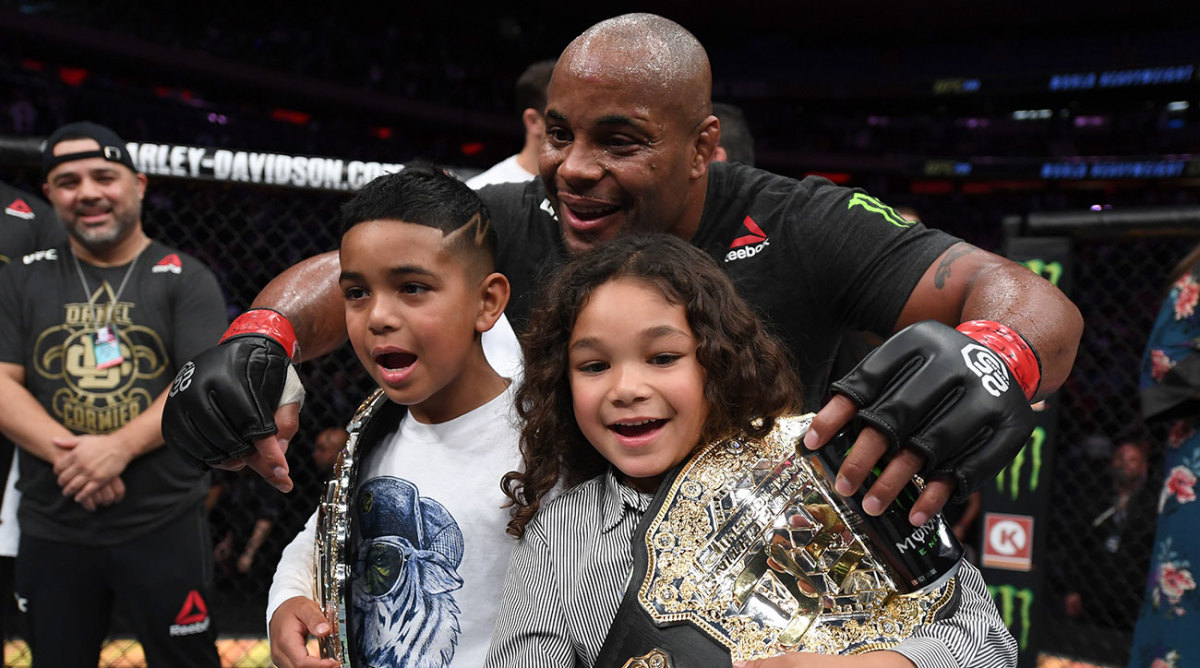Once Again, Daniel Cormier Halts Time and Fortifies Legacy

Inside the dimly lit bathroom, Daniel Cormier screams. Fifteen minutes from now on Saturday night, the 39-year-old will enter Madison Square Garden and successfully defend his heavyweight title with a second-round submission of challenger Derrick Lewis, fortifying his legacy as one of the UFC’s most accomplished fighters ever. This is how he always gets ready.
HAAA!
HAAA!
Back and forth he paces, past the sink and soap dispenser, music thumping through an open door. His breaths are deep and measured—smooth inhales through the nose, sharp exhales out the mouth. His gaze is fixed on the tiled floor, ignoring his reflection in the mirror. His wrists are wrapped in tape. He reaches the toilet, turns around and continues talking to himself.
COME ON, DC!
LET’S GO BABY!
KICK HIS ASS, DC!
THIS GUY’S GOT NOTHING FOR YOU!
Inside the brightly lit press conference room, Bob Cook smiles. It’s an hour and a half later. He is standing near the back, noshing on a slice of pepperoni pizza. As longtime cornerman and coach, Cook observes Cormier perform this amusing pump-up ritual before every bout. “Just talking to himself in the third-person,” Cook says with a laugh. Whatever works for the champ.
More than anything, though, it was a refreshing return to normalcy following a nerve-wracking lead-up. Around 10 a.m., that morning, Cormier was awaking in his Manhattan hotel room when he sneezed and slipped his back. He tried to soldier on, attempting a light run, but his muscles remained rigid. And so he spent the day sprawled across a massage table, receiving rubdowns while hooked into a stim machine. “If you don’t get better, then we’re going to have to make a decision on whether or not you’re going to fight,” Cook had warned.
Finally, once Cormier awoke from an afternoon nap, his back released. From there he did precisely what many expected from overwhelming favorite at minus-500: bobbing around his opponent’s sledgehammer right hand, grappling the 6-foot-3 Lewis to the ground, embracing his tactical advantages rather than entering a firefight of fists. But Cormier had everyone worried for a time. “It was very scary,” he told reporters, “because I had no idea how we were going to explain that one. I sneezed and hurt my back. That’s getting old.”
The end is indeed near, at least in the octagon. “Father Time is knocking on the door,” Cook says, “and we’re not going to win that fight.” Assuming he delivers on his long-stated promise, only one more main card remains before Cormier retires after turning 40 next March. The obvious choice for a final opponent is Brock Lesnar, though Cormier did not rule out returning to light heavyweight if Jon Jones becomes available. As it stands, no other fighter has ever held multiple belts at the same time--and successfully defended both. “That’s why you can’t dispute it,” says Javier Mendez, another one of Cormier’s fight coaches. “He’s the greatest of all-time.”
A good number of fans might disagree, judging by the speckled boos that accompanied every Cormier takedown attempt. But Cormier is a diligent student of the sport, devouring film during fight week. He understood that even trading arm-bars was too risky of a tactic given Lewis’ colossal power and knockout potential. As such, Cook had cautioned him against letting “ego get in the way” of Cormier’s clearest path to victory. “Only chokes were allowed,” Mendez says. “And DC didn’t exchange with him. That’s what we didn’t want. It would’ve been more exciting for the fans, but we could’ve been on the other side of a loss. He did it perfect.”
There was another reason why Cormier went to the mat. In the process of smashing Stipe Miocic to claim the heavyweight title at UFC 226 in July, Cormier suffered a broken knuckle and dislocated joint on his right index finger. He babied the hand through a short-notice training camp, hoping that it would heal on time. “It’s still not 100 percent,” Cook says. “That was one of the things we grappled with. We were worried, are you going to break it again?”
No need. After parrying away several surprising kick attempts, Cormier scored an early takedown on Lewis, who turtled for the rest of the opening round. Lewis eventually connected on a punch, which Cormier reported as causing his vision to fog, but barely missed several other haymakers. Finally, rising from a headlock, Cormier clipped Lewis’ ankle and sent the 265-pounder toppling backwards. From his perch in Cormier’s corner, seeing his fighter climb aboard and begin wrenching an arm underneath Lewis’ chin, Mendez remarked, “It’s over.”
Daniel Cormier defends his UFC heavyweight title with a second-round submission of Derrick Lewis!
— Sports Illustrated (@SInow) November 4, 2018
(via @ufc) pic.twitter.com/hNd3kS0zoo
After coaxing the tapout at 2:14, Cormier rose and beckoned with both hands, calling for his two belts. Nearby, head shaking in disbelief, Lewis kicked over a stool. The hulking Houston resident had risen to viral prominence after a buzzer-beating knockout of Alexander Volkov in Las Vegas last month, scoring a sponsorship agreement with Popeyes and a title shot at Cormier, which he entered as a plus-390 underdog. It wasn’t hard to see why in hindsight. “Derrick is a specialist,” Cormier said. “They struggle with guys who can do just about everything.”
This is extra true about Cormier, the former college all-American and Olympic wrestler who also commentates UFC matches, hosts a weekly studio show, runs a youth wrestling club in San Jose and, just for good measure, serves as the full-time head coach of the Gilroy High School team. All of those avenues will remain open whenever Cormier decides to leave the octagon, regardless of what unfolds over the next five-plus months until his birthday. In that regard, Saturday night was always supposed to be another stepping stone, one final crescendo leading to the climax of his career. The champ did not slip.

As daylight saving time comes and goes, Cormier enters the press conference room and sits down at a table, flanked by two shimmering belts. His two children, 7-year-old Daniel and 6-year-old Keke, watch intently from the second row, presumably up way past their bedtimes, but with pretty good reason. Standing behind the camera riser in the back, Cook is asked whether he truly believes Cormier will quit after their next bout. The coach pauses.
“We’ll see,” Cook says. “I don’t know. He’s a competitor. He loves competing. It’s going to be very hard for him to stop. He’s been competing since he was a little kid. That is a hard transition, when you’ve loved and lived to compete, to walk away. Who knows how many more times we’ll see him in the ring, but I’d love to see him quit on top.”
